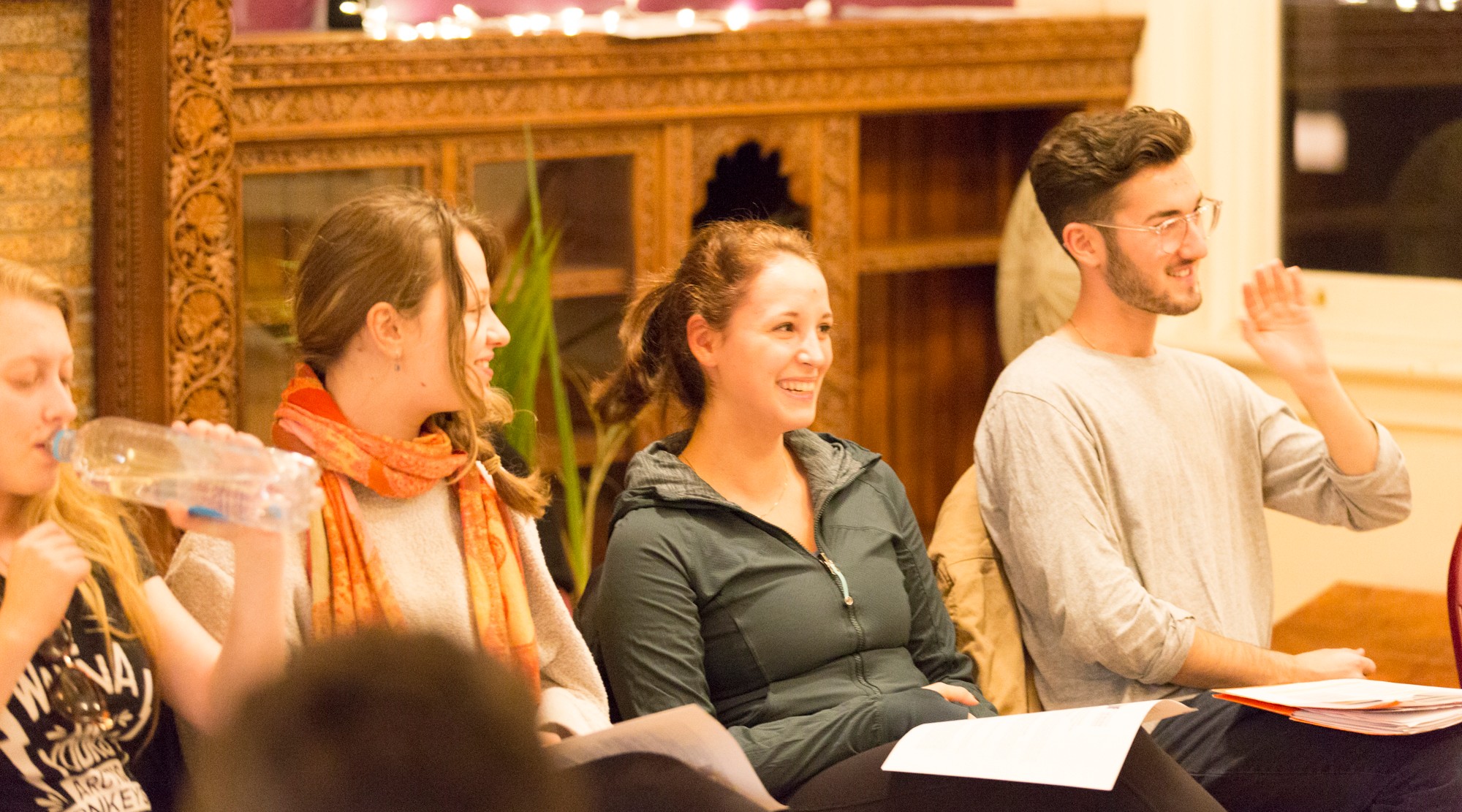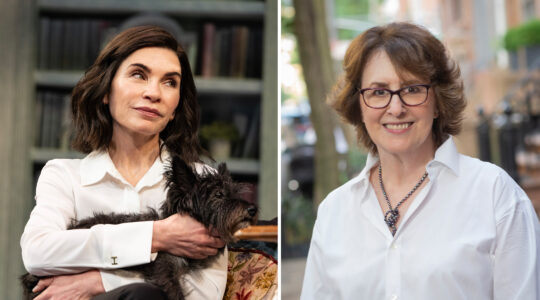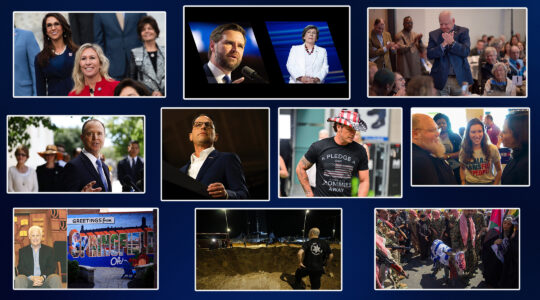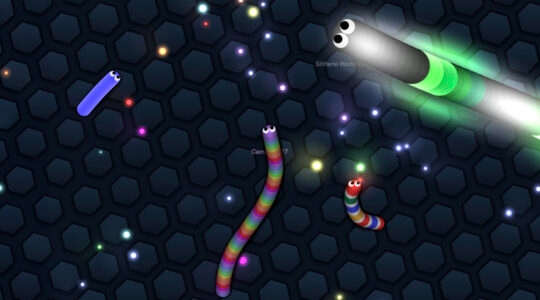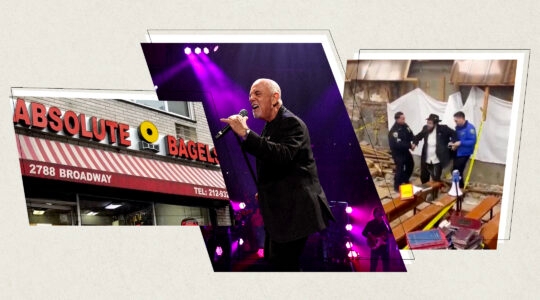When Sophie Tannenbaum, a senior at the University of Pittsburgh, found herself wondering if she’d ever meet her soulmate – and if there even is such a thing – she knew she could discuss it with her friends.
But she also turned to another source: the Babylonian Talmud.
Tannenbaum was a member of an unusual 10-week class on sex, love and romance in Jewish sources. The class wasn’t for credit, but part of a Jewish Learning Fellowship developed by Hillel International’s Office of Innovation and aimed at Jewish college students who might not otherwise encounter Jewish texts.
Meeting for two hours each week, the students explored such issues as whether love is an emotion or an action, how to cope with being queer and Jewish, and does “the one” exist. Their sources ranged from the Torah to the poetry of Yehuda Amichai.
“We had a very diverse group of students in the room,” Tannebaum said, from the very religious to those who hadn’t ever really gone to Hillel programs. “It gave us an opportunity to explore taboo subjects which you can’t always talk about in every Jewish space.”
The fellowship, now in its 11th year, stands out for its relatively unique approach for engaging moderately affiliated and unaffiliated Jewish college students: with serious Torah study requiring considerable time commitment. The idea is to introduce young Jews to Jewish communal life and Torah study in a group setting. It’s been surprisingly popular, organizers say.
“We literally have a waiting list of students who would like to be studying Torah at Hillel,” said Erica Frankel, director of the Meyerhoff Center for Jewish Experience at Hillel International. “If you had asked us 10 years ago if that would be the case, we might have laughed at you.”
The program has nearly tripled in the past year alone, from 51 to 141 campuses, and more than 3,300 students participated this year. Several hundred more are on a waitlist to participate.
The secret to the program’s success is the group approach, which acts as a social network for the students, said Dan Smokler, Hillel’s chief innovation officer. The students also receive small stipends to participate, which Hillel implemented to allow students to participate who might otherwise have to work.
“We found that what they were most getting out of it was a group of a friends, a mentor and a sense of community,” Smokler said.
Smokler was a graduate student when he and Rabbi Yehuda Sarna, the executive director of New York University’s Bronfman Center for Jewish Student Life, built on the content of the basic program that Sarna had launched in 2007. It remained an NYU project for seven years until Smokler decided to try scaling it.
Frankel, whose job has been to grow the program, said at first she thought she would spend a lot of time convincing Hillel directors to try it. But after the first five campuses came on board, Hillel was bombarded with emails by other eager campuses.
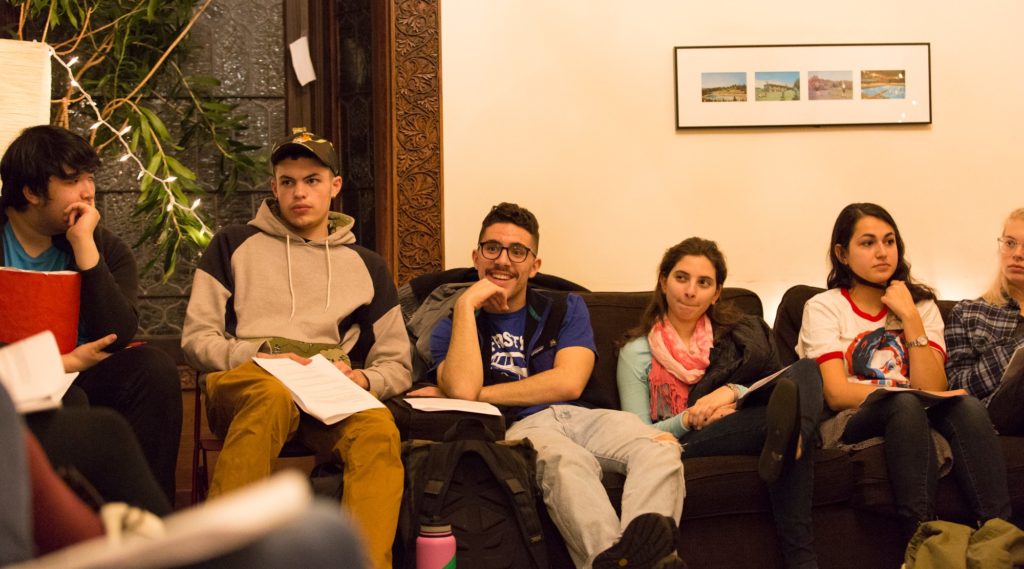
Students at New York University participate in a Hillel-run course designed to introduce young Jews to Jewish communal life and Torah study in a group setting. (Jackson Krule)
Danielle Kranjec, the senior Jewish educator at the Hillel Jewish University Center of Pittsburgh, said she never could have anticipated just how important the fellowship would be after the deadly shooting in October at the city’s Tree of Life synagogue, which killed 11 congregants.
“Having the fellowship as a Jewish identity-focused group when the shooting happened was a real source of strength and comfort to the students during that time,” Kranjec said. “We ended up opening our group to anyone who wanted to come that week to process, and many who came that night ended up joining the next cohort. It really ended up being part of the heartbeat of Hillel this year.”
The course has multiple curricula. The introductory one used at most campuses is called “Life’s Big Questions,” but there are three other introductory courses: on romance, on justice and on Judaism as art. Hillel’s Office of Innovation writes the curricula, and Hillel educators on each campus adapt it as appropriate.
The introductory curriculum exposes the students to classic Jewish texts like the Mishna Pirkei Avot (the Ethics of the Fathers), the Torah and the Passover Haggadah, as well as contemporary writings like “A Letter in the Scroll” by erstwhile U.K. Chief Rabbi Jonathan Sacks. The classes range from 15 to 25 students.
Leah Kahn, senior Jewish educator at the University of California, Berkeley, Hillel, said students often finish the 10-week course asking for more.
To satisfy that demand, she developed her own advanced course curriculum on “Life’s Bigger Questions” and was hired by Hillel International to standardize it for use by other campuses. The classes include “#Blessed: The Inner Life vs. the Public Persona” and “I’m Not Religious, I’m Spiritual: Toward a Vibrant Jewish Lifestyle.” A few more curricula are in development, including one on Mussar, or Jewish spiritual practices, created in partnership with the Institute for Jewish Spirituality.
“Students come away with a clearer sense of how Jewish tradition can impact their contemporary lives,” Kahn said. “They realize as emerging adults that the tradition has something to say to them. We use the Torah to answer universal human questions, and they feel more connected to their tradition.”
Hillel educator Daniel Levine, who works with students at the University of California, Irvine, Chapman University and Cal State Fullerton, ran the program this year for students from those three schools. The community that formed among the cohort was remarkable, he said.
“We don’t have a building,” Levine said. “We’d meet at the student center at Chapman from 7 to 9 p.m., and for those two hours and afterwards it really felt transformed into a Hillel or JCC. There were nights where, after class, other students from past sessions would come and join us to hang out. Without a building, this was something that really has helped us out in building a community.”
First-year Chapman student Itai Janai was among the participants.
“Even though I identify as an agnostic Jew, I liked learning what the Talmud had to say about certain things, from a historical and cultural perspective — like getting more insight into the Passover story,” Janai said. “Our teacher was great at playing devil’s advocate and getting us to look at the different sides of an issue.”
Frankel said the curriculum is a great way to introduce Jewish students with little formal Jewish education to their own tradition.
“Students come to college and want to engage in the great conversation of ideas,” Frankel said. “They are looking for a place to ground and root themselves during a period of their lives marked with uncertainty. Torah is one way to engage with those questions.”
Emma Dorn, a junior at Cal Irvine who grew up in a “very secular” home, said the program “came at the perfect time, when I’m thinking about what I want to do with my life and getting more in touch with my Jewish side of myself.”
Now Dorn is considering becoming a Hillel professional after graduation. She credits the Jewish Learning Fellowship.
“I’ve learned so much about what Jewish culture is, as well as the many different ways Jewish culture is in my life without my realizing it,” she said. “I love learning about the different perspectives in Judaism, as well as the fact that we’re supposed to ask questions.”
JTA has documented Jewish history in real-time for over a century. Keep our journalism strong by joining us in supporting independent, award-winning reporting.
The Jewish Learning Fellowship, operated by Hillel's Office of Innovation, is the largest Jewish educational program on North American college campuses
More from Hillel Office of Innovation